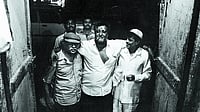
The very experience of buying from a Tasmac outlet can be traumatising. Says documentary filmmaker Tarun Saldanha: "The salesmen stand behind iron grills. The buyer is made to feel unwanted, as if he's doing something shady. In Delhi or Bangalore one can walk through the shop and browse." He wonders how the government legitimises drinking on the streets at Tasmac outlets but goes moral on Chennai's few pubs. Even the working class has the right to drink in more hygienic conditions than what prevails in the government-run bars, some of which sell booze at 20 per cent above the mrp after midnight, with the moral police looking the other way.
All these hurdles boost the bootleggers' market. Brands sourced from neighbouring Pondicherry are home-delivered for an extra Rs 100 or Rs 200 on a phone-call. Or, as bookseller V.R.J. Prabalan says, "A contact in the defence services or an ex-serviceman is enough." Prabalan and his pals were about to start an Old Monk International Club "since it's the only international quality Indian brand. But with Mohan Breweries manufacturing Old Monk in TN, the quality deteriorated so much we abandoned the idea". In fact, not only does KF beer taste different when bottled by TN's Balaji Distilleries, even the shape of the bottles is not like the ones in Bangalore or Delhi, says Saldanha. "The snout tapers off earlier in Chennai's bottles." Worse, KF lager retails at Rs 53 compared to Rs 32 in Pondicherry. Regrets Anushka Meenakshi, 24-year-old filmmaker: "While the rest of the country savours a range of wines, in Chennai you get nothing except Golconda red which is like cough syrup." High-end bars charge a tax of 57 per cent on Grover and Sula wines and 70 per cent on imported wines.
Clubs in Chennai offer some solace. As Latha Kumaraswami, the sole woman committee member at the Presidency Club, points out: "It's comfortable and affordable at clubs." However, they serve just an elite few.
Says Giri: "Today, Chennai is part of a global village. It has thriving BPO and IT industries. The state attracts FDI from Motorola and Dell. Why not an open market when it comes to liquor?" He suggests that the annual licence fee (Rs 4 lakh) be hiked and bars and nightclubs be allowed to operate later than the current 11.30 pm. The South India Hotels and Restaurants Association recently urged the government to permit more bars and extend timings till 2 am to cater to foreign tourists and IT professionals.
The government's hardly on the same wavelength. As a hotelier puts it, "Politicians offers liquor for votes, but have double standards when it comes to opening up the liquor market."






















